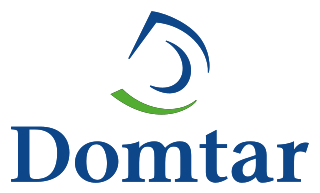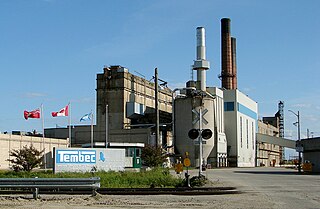
Saguenay is a city in the Saguenay–Lac-Saint-Jean region of Quebec, Canada, on the Saguenay River, about 200 kilometres (120 mi) north of Quebec City by overland route. It is about 126 kilometres (78 mi) upriver and northwest of Tadoussac, located at the confluence with the St. Lawrence River. It was formed in 2002 by merging the cities of Chicoutimi and Jonquière and the town of La Baie. Chicoutimi was founded by French colonists in 1676.
The pulp and paper industry in Canada is one of the country's most important and profitable industries.. It is especially concentrated in Ontario and Quebec and plays an important role in many other provinces..

Domtar Corporation is the largest integrated producer of uncoated free-sheet paper in North America and the second largest in the world based on production capacity, and is also a manufacturer of papergrade pulp.

The economy of Quebec is diversified and post-industrial with an average potential for growth. Manufacturing and service sectors dominate the economy. If Quebec were a country, its economy would be ranked the 33rd largest in the world just behind Norway. Quebec is also ranked the 21st largest in the Organisation for Economic Co-operation and Development. The economy of Quebec represents 19.65% of the total GDP of Canada.

Pointe-Claire is a municipality on the Island of Montreal in Quebec, Canada. It is entirely developed, and land use includes residential, light manufacturing, and retail. The population is about 31,380 as of the 2016 Census.

Tembec Industries Inc., known as Tembec, was a paper company in Canada, founded by Frank Dottori. In 2011, Tembec had approximately 3000 employees, with locations in Canada, United States, and France. Tembec's operating divisions included Forest Products, Pulp, Paper & Paperboard, and Chemicals.

Cascades is a Canadian company that produces, converts, and markets packaging and tissue products composed mainly of recycled fibres. Cascades employs more than 11,700 people in more than 85 operating units in North America. It was founded in 1964.
Arborite is the leading Canadian manufacturer of high-pressure decorative plastic laminates (HPL). Best known as a counter top surfacing material, laminate is a durable decorative veneer applied to cabinetry, furniture, and other horizontal and vertical surfaces. The original Arborite material was developed in 1942 by the Howard Smith Paper Company as an innovative way to utilize waste by-products of the Canadian papermaking industry, and to this day laminate is commonly referred to in Canada by the trade name Arborite.
The Canadian International Paper Company (CIP) was a Montreal-based forest products company, a former subsidiary of International Paper. It was originally formed as the St. Maurice Lumber Company in 1919 but was renamed in 1925. It was sold to Canadian Pacific Forest Products in the early 1980s, which became Avenor Inc. in 1994; this company was then bought by Bowater in 1998.

Resolute Forest Products, formerly known as AbitibiBowater Inc., is a pulp and paper manufacturer headquartered in Montreal, Quebec, Canada, formed by the merger of Bowater and Abitibi-Consolidated, which was announced 29 January 2007. At the time, AbitibiBowater was the third largest pulp and paper company in North America, and the eighth largest in the world. On 1 July 2012, the company name changed to Resolute Forest Products.

Windsor Salt is a salt mining, processing, and distribution company based in Pointe-Claire, Quebec, Canada. It operates salt mines in Pugwash, Nova Scotia and Windsor, Ontario. From the salt it mines and produces through evaporative processes, it produces and distributes products for household use, food production, as well as products for agricultural, commercial, and industrial use. Government agencies use a number of its products for ice control on roads in the winter.
The Russian forestry industry is a set of Russian industries related to wood harvesting and processing. As one of the oldest sectors in the country's economy, Russia's timber industry continues to bring in about $20 billion per year. Russia has more than a fifth of the world's forests, making it the largest forest country in the world. According to data for 2015, the total forest area has exceeded 885 million hectares, representing 45% of the total area of the country. The stock of wood in the area was 82 billion cubic meters.
This article outlines the history of Canadian technological invention. Technologies chosen for treatment here include, in rough order, transportation, communication, energy, materials, industry, public works, public services, domestic/consumer and defence technologies.
The Forest Products Association of Canada (FPAC) is a trade association which represents Canada's wood, pulp and paper producers both nationally and internationally in government, trade, and environmental affairs. Canada's forest products industry is an $80 billion a year industry that represents 2% of Canada's GDP.
Kruger Inc. is a Canadian corporation which manufactures publication papers, tissue, lumber and other wood products, corrugated cartons from recycled fibres, green and renewable energy, and wines and spirits. Kruger Inc. operates facilities in Québec, Ontario, British Columbia, Newfoundland and Labrador, and the United States.

The environmental effects of paper are significant, which has led to changes in industry and behaviour at both business and personal levels. With the use of modern technology such as the printing press and the highly mechanized harvesting of wood, disposable paper became a relatively cheap commodity, which led to a high level of consumption and waste. The rise in global environmental issues such as air and water pollution, climate change, overflowing landfills and clearcutting have all lead to increased government regulations. There is now a trend towards sustainability in the pulp and paper industry as it moves to reduce clear cutting, water use, greenhouse gas emissions, fossil fuel consumption and clean up its influence on local water supplies and air pollution.
The Paper Province is a business cluster for the pulp and paper industry in Värmland, northern Dalsland and the county of Örebro in central Sweden. It is focussed on encouraging collaboration on marketing, skills development, procurement, project development and regional growth. The cluster organization is owned and operated by its 90 member companies, from global giants to local suppliers, representing the entire value chain.
Green building results in structures that are environmentally responsible and resource-efficient throughout their lifecycle – from siting to design, construction, operation, maintenance, renovation, and demolition. A 2009 report by the U.S. General Services Administration evaluated 12 sustainably designed GSA buildings, and found they cost less to operate and have excellent energy performance. In addition, occupants were more satisfied with the overall building than those in typical commercial buildings.

The Canadian forestry industry is a major contributor to the Canadian economy. With 39 percent of the land acreage of Canada covered by forests, the country contains 9 percent of the world's forested land. The forests are made up primarily of spruce, poplar and pine. The Canadian forestry industry is composed of three main sectors: Solid wood manufacturing, pulp and paper and logging. The Forests and forestry are managed by The Department of Natural Resources Canada, the Canadian Forest Service, in cooperation with several organizations which represent government groups, officials, policy experts and numerous other stakeholders. Extensive deforestation by European settlers during the 18th and 19th centuries has been halted by more modern policies. Today less than 1 percent of Canada's forests are affected by logging each year. Canada is the second largest exporter of wood products, and produces 12.3% of the global market share. Economic concerns related to forestry include greenhouse gas emissions, biotechnology, biological diversity and infestations of pests, such as the mountain pine beetle.
Richard M. Berry is a British-Canadian chemist who specializes in the production of nanocellulose. He is Vice-President, Technology & Chief Technology Officer at the CelluForce company in Montreal, Quebec, Canada. He is a member of the Board of Directors (2016-2018) for TAPPI where he has been a fellow since 2005. Berry has published more than 100 articles and holds 24 patents.









